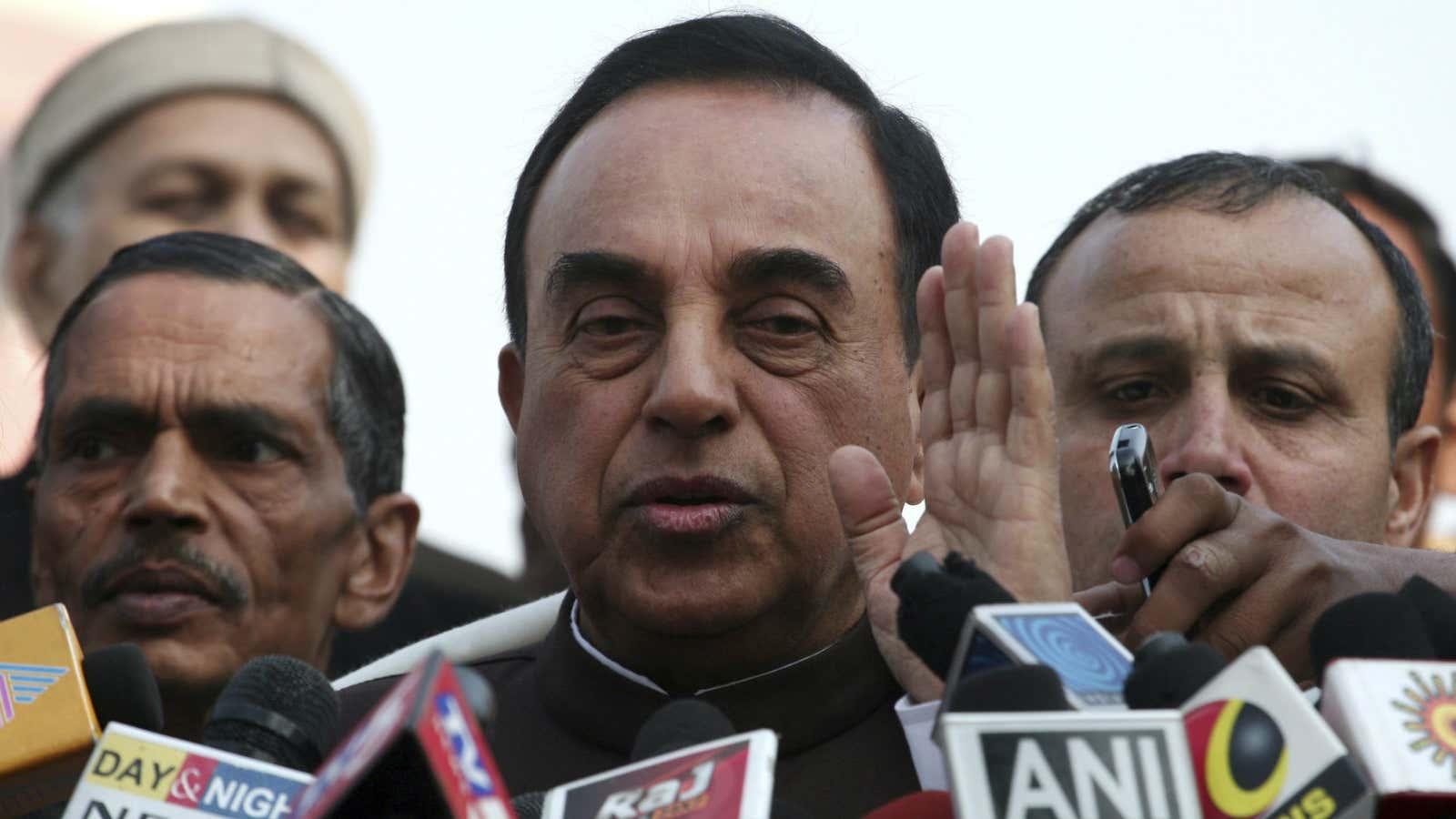Subramanian Swamy is back.
The senior member of India’s ruling Bharatiya Janata Party (BJP) has shot off another letter to prime minister Narendra Modi asking him to get rid of Reserve Bank of India governor, Raghuram Rajan.
Swamy’s obsession with the central banker was revealed earlier this month when the Rajya Sabha member questioned Rajan’s competency. About a week later, on May 17, Swamy wrote to Modi, claiming that Rajan “wasn’t mentally fully Indian.”
On May 26, the former Harvard professor wrote another letter stating six reasons why Rajan—named the Central Banker of 2016—should be fired.
Most of those reasons, like his earlier allegations, are comical if anything. Here’s a run-down:
“Rajan is acting more as disrupter of the Indian economy than the person who wants the Indian economy to improve. Moreover he is in this country on a Green Card provided by the US government and therefore mentally not fully Indian.”
Rajan is on leave from his post as professor of finance at the University of Chicago’s Booth School of Business. Moreover, a green card—an authorization that a person can live and work in the US permanently—presumably doesn’t make someone less Indian. Modi, himself has often praised the Indian diaspora in his speeches and holds them in high regard.
“I cannot see why someone appointed by the UPA Government who is apparently working against Indian economic interests should be kept in this post when we have so many nationalist minded experts available in this country for the RBI Governorship.”
Rajan has tackled inflation and is helping banks clean up some Rs13 lakh crore of bad loans—bigger than the size of at least 112 economies in the world. He has also prioritised financial inclusion in the country.
“Dr Rajan’s insistence on raising interest rates leading to recession in the domestic small and medium industries and thereby causing not only a sharp decline in output but massive unemployment of semi-skilled labour.”
As Quartz pointed out on May 13, raising interest rates was more of a necessity than choice. Besides, over 2.75 lakh jobs have been created since Modi took charge. India’s finance minister Arun Jaitley, too, has referred to a “mature relationship” with the RBI.
“The RBI governor post is very high in the Warrant of Precedence and requires a patriotic and unconditional commitment to our nation.”
What exactly has Rajan done to prove otherwise, isn’t entirely explained by Swamy. Never mind the fact that Rajan has been voted the world’s best central banker for how he’s handled the situation in India.
“As governor of RBI, Dr Rajan has sent confidential and sensitive financial information to various persons around the world on his University of Chicago unsecure personal email address. This is a reckless disregard of the national security of India.”
Swamy hasn’t furnished any proof to back his allegation.
“Despite being a government official he has been publicly disparaging of the BJP government….In a Washington meet recently he disparaged the growth rate of India as being equal to a cockeyed person in the land of blind persons.”
In Jan. 2015, India changed the way it computes its GDP, which suddenly boosted economic growth numbers. Many, including the country’s chief economic adviser, have questioned the new method and wondered whether it really shows the situation on ground.
“Dr Rajan is a member of the US dominated Group of 30. From a close reading of the group’s objectives it appears to be a group set up to defend US’s dominant position in the global economy.”
The Group of 30 describes itself as ”a private, nonprofit, international body composed of very senior representatives of the private and public sectors and academia. It aims to deepen understanding of international economic and financial issues, to explore the international repercussions of decisions taken in the public and private sectors, and to examine the choices available to market practitioners and policymakers.”
Other members include Bank of England governor Mark Carney, Singapore’s deputy prime minister Tharman Shanmugaratnam, and Zhou Xiaochuan, governor of the People’s Bank of China.
